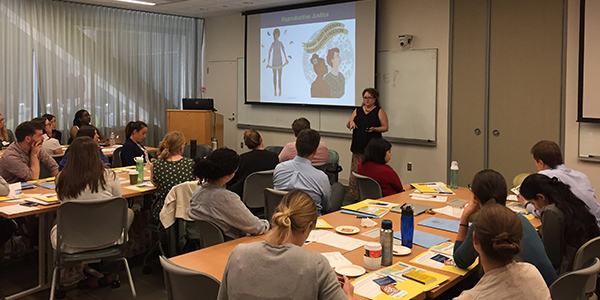Long-Acting Reversible Contraception - LARC
Birth Control Initiative Reduces Teen Pregnancies in Rochester
The Long-Acting Reversible Contraception (LARC) is an example of an innovative model for community partnerships and the 1,000 Days Initiative
Six years ago, the Hoekelman Center — a program that connects doctors from the department of Pediatrics with non-profits to benefit kids and adults by making our communities healthier places to live — launched a new program in Rochester: the Long-Acting Reversible Contraception Initiative. Referred to as LARC, the initiative was designed to increase access to highly effective methods of birth control — including intrauterine devices and contraceptive implants — for adolescents in Rochester.
Since launching, the rate of teen pregnancy in Rochester has declined from 8 to 5 percent, a more significant improvement than New York State as a whole, according to the New York State Department of Health. In addition, usage of LARC among sexually active high school females in Rochester increased from 4 to 24 percent from 2013-2017, compared to an increase from 2 to 5 percent nationally. Due to these results, the initiative has become a model for community partners collaborating to spread innovation in healthcare. It also directly aligns with the strategic plan’s 1,000 days initiative underway at Golisano Children’s Hospital.
“The 1,000 days initiative is about improving the health and well-being of children from ages zero to three. But, part of what determines a baby’s health is what happens before birth. This is why we, along with community partners such as Healthy Baby Network and the March of Dimes, care about healthy babies and also care about access to effective birth control,” said Andrew Aligne, M.D., M.P.H., of the Hoekelman Center.

LARC team members Rosa M. Lloyd, M.B.A., Kelly McDermott, M.A., Jessica VanScott, M.P.H., Katherine Greenberg, M.D., and Andrew Aligne, M.D., M.P.H.
Studies have shown that unintended teen pregnancy can lead to a number of critical health and social problems for young parents and their children: low birth weight, unemployment, school failure, among many other serious issues. Because of these risks, the Centers for Disease Control and Prevention (CDC) has declared teen pregnancy a national public health priority and the CDC, along with the American Academy of Pediatricians and the American College of Obstetricians and Gynecologists, recommends LARC as a safe and highly effective method of pregnancy prevention for adolescents seeking contraception.
“We’re not trying to prevent individuals from having a family,” said Aligne. “We want to help make sure that they’re able to do it when they choose to, because helping to reduce unintended pregnancy contributes to helping people have healthier babies.”
Aligne and his team have lead the community effort to promote LARC by conducting outreach to local organizations that work with youth. They employ a simple, lunch-and-learn approach that forms the backbone of the Hoekelman Center’s advocacy work.
“An interesting aspect of the LARC project is that we talk to adults, not to teens. We work with our community partners to teach adults about birth control. This way, they can help teens to make well-informed choices about preventing unintended pregnancy,” says Jessica VanScott, M.P.H., the LARC Initiative’s health project coordinator, who runs all logistical aspects of the initiative.

LARC team members regularly present to community organizations to spread awareness.
Through their research with area teens, the LARC team found that many were interested in learning about birth control, and that they often asked their most trusted peers and adults for advice.
“If teens are learning outside the medical setting from trusted youths and adults, then how do we increase the likelihood that anyone they talk to will share accurate information? We thought it could help if we gave resources with useful information to adults who work with teens in the community,” said Aligne.
So far, they have presented to more than 2,700 adults in health care settings, as well as those in community settings, such as staff of after-school programs. The talks provide information about the safety, efficacy, and availability of LARC, with the goal of improving knowledge and access at the community level.
“LARCs are more effective than pills, patches, and other contraceptives because they remain in place all the time,” said Katherine Greenberg, M.D., an adolescent medicine specialist at Golisano Children’s Hospital. “Today’s LARCs are safe, effective, invisible, and can be easily removed with no lingering effects when you decide to become pregnant.” LARC methods protect against pregnancy for up to three to 12 years, can be removed at any time, and are 40 times more effective for teens than the traditional birth control pill.
The Hoekelman Center’s efforts are bolstered by an extensive network of local agencies, including the initiative’s core partners: the Metro Council for Teen Potential, Highland Family Planning, Planned Parenthood of Central and Western New York, and the Greater Rochester Health Foundation, which is the primary funder of the program.
“We have been nothing but impressed with the project,” said Matthew Kuhlenbeck, president and CEO of the Greater Rochester Health Foundation.
Thanks to new support from Accountable Health Partners (AHP), the Initiative will expand and provide more educational sessions to regional providers in 2020. The program continues to receive positive feedback and anecdotes from adults who promote it and the teenagers who have adopted its use. “An IUD was the best choice for me, because now I don’t have to remember to take a pill every day, which is really hard to do!” said Rebecca, age 17. “It is also great to know that I will have protection for many years, including when I am super busy with activities in college.”
To learn more about the LARC Initiative, visit www.hoekelmancenter.org.